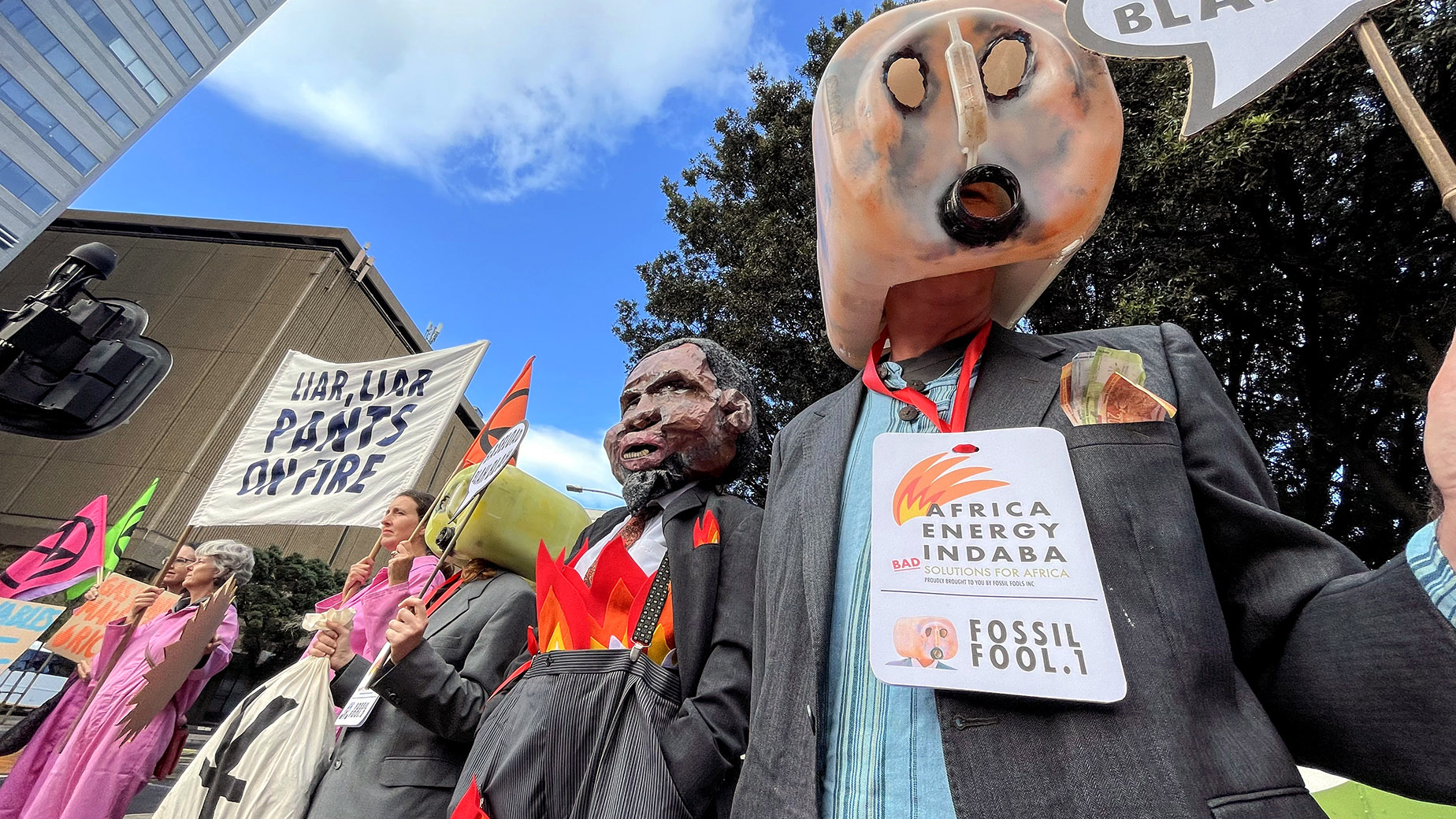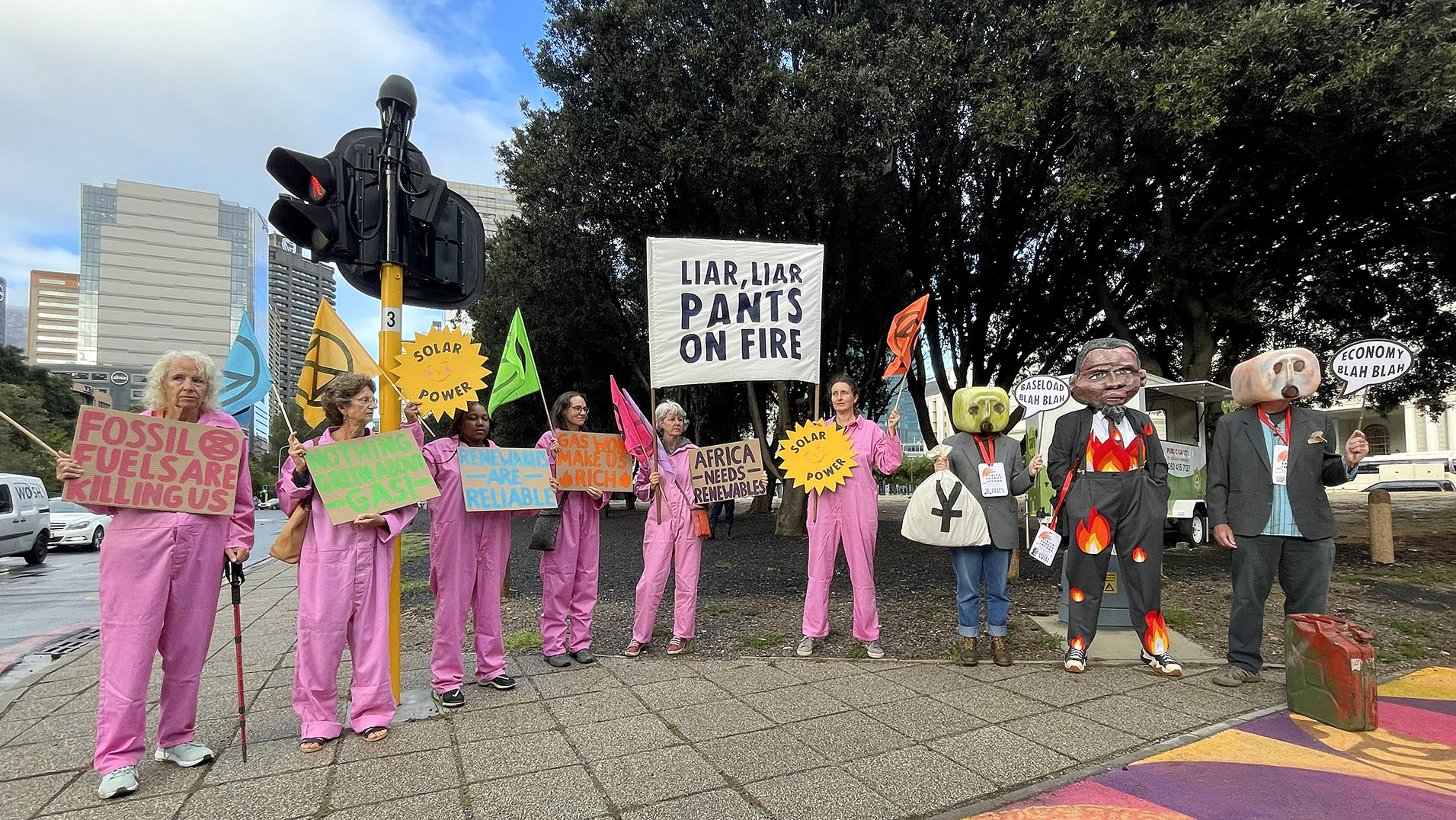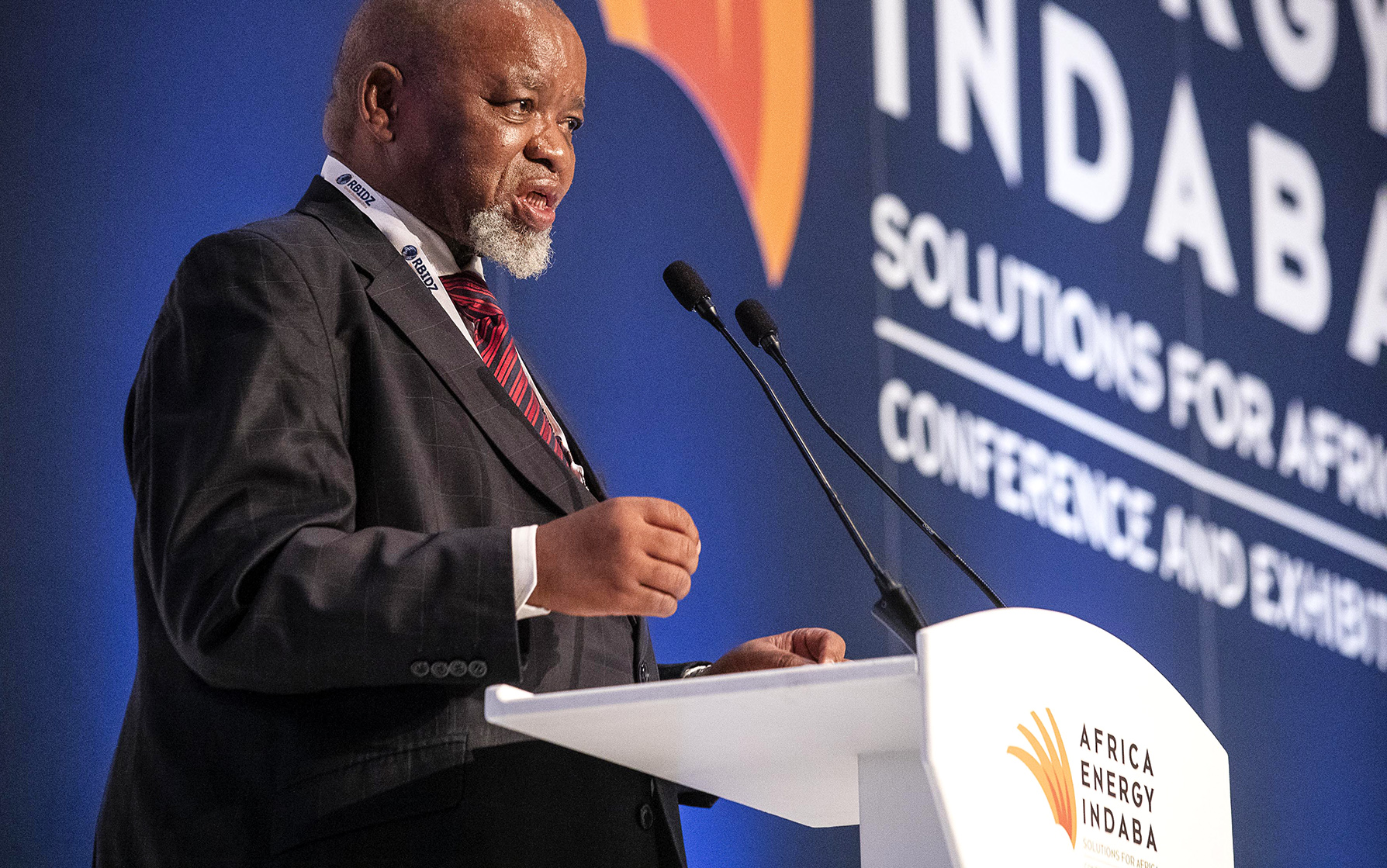In his keynote speech at the Africa Energy Indaba on Tuesday at the Cape Town International Convention Centre, Energy and Mineral Resources Minister Gwede Mantashe allayed fears that South Africa would run out of natural gas in June 2026, when Sasol will stop supplying the resource from Mozambique.
Manatshe said alternative plans were already being implemented to mitigate the impact and avoid a shortage.
 Extinction Rebellion and the Green Connection protesters said investing in new offshore gas projects went against South Africa’s international commitments to reduce greenhouse gas emissions, would damage ocean resources and biodiversity and threaten coastal public property and livelihoods. (Photo: Kristin Engel)
Extinction Rebellion and the Green Connection protesters said investing in new offshore gas projects went against South Africa’s international commitments to reduce greenhouse gas emissions, would damage ocean resources and biodiversity and threaten coastal public property and livelihoods. (Photo: Kristin Engel)
With the Department of Trade, Industry and Competition, the Department of Energy and Mineral Resources had established a task team that included private sector players to develop a joint strategy that “will ensure a seamless transition and business continuity, thus ameliorating potential job losses”.
Mantashe said a Gas Master Plan would be presented to Cabinet this month.
“To further mitigate the negative impacts of this eventuality, last year we entered into negotiations with the Mozambican government and crafted a memorandum of understanding (MOU) covering two aspects: partnering and trading on electrons from their Mphanda Nkuwa project and partnering and trading on gas molecules from their newly discovered gas fields and Matola LNG hub,” he said.
Read more in Daily Maverick: SA has ‘four months’ to avoid a natural gas Day Zero as Sasol contract supply crisis looms
The minister said that the MOU was ready to be signed and would be put into action this month.
As part of interventions through the Central Energy Fund, Mantashe said the government had signed a gas sales agreement with Empresa Nacional de Hidrocarbonetos (ENH) in Mozambique, with a potential to deliver up to 200 petajoules of natural gas.
PetroSA has applied to the National Energy Regulator of South Africa (Nersa) for a gas trading licence for this agreement and according to Mantashe, the granting of the licence will ensure a continuous gas supply.
Africa Gas Forum
During the Africa Gas Forum, a side event at the indaba on Monday, stakeholders raised concerns about how issues with clean fuels, infrastructure and development had hindered positive developments from the boom of gas in Africa.
One participant said, “We’ve heard about the boom of gas in Africa, but it appears that the one to benefit most over the years is the conference industry.”
The participant claimed that year after year the same conversations and speeches were made at energy conferences with little to no action, resulting in the supply of domestic gas being stifled in SA.
Nick Mitchell from the Onshore Petroleum Association of South Africa said new legislation was needed to unlock the supply of domestic gas in South Africa.
Protest action and myth-busting
 Protesters outside the 16th annual Africa Energy Indaba at Cape Town International Convention Centre. (Photo: Kristin Engel)
Protesters outside the 16th annual Africa Energy Indaba at Cape Town International Convention Centre. (Photo: Kristin Engel)
Outside the indaba, members of Extinction Rebellion (XR) and the Green Connection protested against “green gas” and gas company executives intent on persuading South African decision-makers to turn to gas as a transition fuel to replace Eskom’s ageing coal-powered fleet.
“They will be repeating the myths that are used to persuade South Africans that we need this fossil fuel. We are here today to dismantle those myths and to say that our energy security, our economic security, our climate security and continued life on Earth all depend on a speedy transition to renewable energy,” said XR spokesperson Judy Scott-Goldman.
The International Energy Agency (IEA) has said that natural gas, which emits less carbon than most other fossil fuels, has a limited role as a transition fuel from coal to renewable energy sources. However, the agency said natural gas power generation may still be needed as backup for variable wind and solar power.
Lisa Makaula, an advocacy officer for the Green Connection, told Daily Maverick: “We are concerned that gas is promoted to be climate-friendly, given the fact that gas has been proven to be 80 times more impactful compared to carbon dioxide due to the greenhouse gas emissions it releases, namely methane.
 Members of Extinction Rebellion and the Green Connection protest against ‘myths associated with green gas’ outside the Africa Energy Indaba in Cape Town on Tuesday, 5 March 2024. (Photo: Kristin Engel)
Members of Extinction Rebellion and the Green Connection protest against ‘myths associated with green gas’ outside the Africa Energy Indaba in Cape Town on Tuesday, 5 March 2024. (Photo: Kristin Engel)
“If we are to curb climate change and respond to it, there should be solutions and a way forward of not investing in projects that are going to accelerate the problem.”
Holding up a placard stating “Nothing green about gas”, Scott-Goldman told Daily Maverick that they were focused on gas because of widespread misperceptions about it.
“The first thing is that Gwede Mantashe is very busy telling the world that we cannot use renewables for baseload power, and yet the Presidential Climate Commission, which is some of the best-informed people on this topic, are saying that we can,” she said.
Scott-Goldman was referring to the report by the Presidential Climate Commission (PCC), which advised that there should be no new coal-fired power stations and that gas should be kept to fulfil the role of peaking support for a renewable-dominated electricity mix.
“In other words, a small amount of gas may be needed but not high use, and gas may not be needed at all once the many different energy storage systems that are currently being developed become mainstream options.
“The PCC not only states that it’s perfectly technically feasible to run our electricity system on renewable energy, but it’s also least-cost. So why would we go for the more expensive option?” Scott-Goldman said.
Critical metals
In an interview with Daily Maverick on the sidelines of the gas forum, Wits Seismic Research Centre director Dr Musa Manzi, who was also a speaker at the event, said that currently, renewable energy could not sustainably power South Africa.
“With renewable energy, wind turbines and solar panels require critical metals such as rare earth, platinum and pegs, manganese and iron and, at the moment, the world is not producing enough of these to manufacture these resources.
“We are struggling to meet the demand for critical metals. That is why we are saying renewables can play an integral role, but at the present moment, they are not able to provide enough energy for all South Africans,” he said.
Scott-Goldman said another misperception was that gas was a clean green fuel that was climate-friendly.
“But the problem is that gas is 90% methane, and methane is a very potent greenhouse gas, 80 times more potent than carbon dioxide over the first 20 years of its life. They’ve now found that there’s leaks of methane all the way along the supply chain,” she said.
Manzi agreed that the use of gas as a fuel was leaking methane into the atmosphere.
“Methane, apart from carbon, can also be dangerous in the short term. Those are things that should be looked at … considering those risks could happen throughout the production process [of gas].
“Carbon emission is as bad as methane emissions, but there are mitigation risks in terms of basically eliminating the carbon as well as the methane at the production stage. Those are things that will be explored; we have to look at carbon and methane because I think it could be as dangerous as carbon,” he said.
The protesters also said it was a myth that using gas would boost South Africa’s economy.
“Gas pricing doesn’t account for the true carbon cost (the climate change harm) of extracting, liquefying, transporting, re-gasifying and burning this fuel, or the environmental damage caused,” Scott-Goldman said.
“Countries that are decarbonising are imposing taxes on carbon-intensive imports, which will make South African goods less competitive globally if we go the route of manufacturing with gas-powered electricity. South Africa is likely to have limited markets for exporting gas because moving gas long distances makes its climate impact worse.”
‘Anti-development’
In response to the protest taking place outside the venue, Mantashe said, “Those who want to demonstrate that we are anti-development must continue demonstrating. Those who want development must push against that stream of anti-development and continue developing.
“Shell wanted to do a seismic survey in South Africa; there were demonstrations all over and Shell left us for Namibia and made oil and gas discoveries there. Today there are 10 wells in Namibia, here we have not touched anything — that is the difference between a positive view that is in favour of development and a view that is anti-development.”
Mantashe said that notwithstanding “persistent threats to the development of the South African upstream petroleum industry by foreign-funded lobby groups”, South Africa had made significant new finds of natural gas.
“The discovery of gas by TotalEnergies in the Outeniqua Basin, and the discovery of maiden gas reserves by Kinetiko Energy in Amersfoort, Mpumalanga, are strategically placed to strengthen South Africa’s energy security and propel the quest for industrialisation that will bring about growth and development,” he said. DM
https://www.youtube.com/watch?v=REeWvTRUpMk




 Outside the Africa Energy Indaba in Cape Town on Tuesday, 5 March 2024, members of Extinction Rebellion and the Green Connection staged a protest action against ‘myths associated with Green Gas’. (Photo: Kristin Engel)
Outside the Africa Energy Indaba in Cape Town on Tuesday, 5 March 2024, members of Extinction Rebellion and the Green Connection staged a protest action against ‘myths associated with Green Gas’. (Photo: Kristin Engel) 